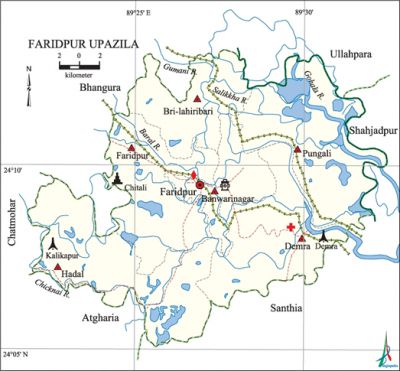Faridpur Upazila
Faridpur Upazila (pabna district) area 137.67 sq km, located in between 24°05' and 24°14' north latitudes and in between 89°22' and 89°32' east longitudes. It is bounded by ullahpara and bhangura upazilas on the north, atgharia and santhia upazilas on the south, shahjadpur upazila on the east, Bhangura and chatmohar upazilas on the west.
Population Total 130335; male 65029, female 65306; Muslim 125492, Hindu 4837 and others 6.
Water bodies Main rivers: baral, Gohala, Gumani, Chicknai; Kenai Pathar Beel is notabale.
Administration Faridpur Thana, now an upazila, was formed in 1869.
| Upazila | ||||||||
| Municipality | Union | Mouza | Village | Population | Density (per sq km) | Literacy rate (%) | ||
| Urban | Rural | Urban | Rural | |||||
| 1 | 6 | 56 | 87 | 14010 | 116325 | 947 | 56.0 | 40.9 |
| Municipality | ||||||||
|
Area |
Ward |
Mahalla |
Population |
Density |
Literacy rate (%) | |||
| 9.63 | 9 | 16 | 14010 | 1455 | 56.0 | |||
| Union | ||||
| Name of union and GO code | Area (acre) | Population | Literacy rate (%) | |
| Male | Female | |||
| Demra 42 | 3915 | 8877 | 8870 | 42.9 |
| Pungali 84 | 7531 | 14396 | 14424 | 40.4 |
| Faridpur 52 | 6621 | 10426 | 10569 | 40.5 |
| Banwarinagar 10 | 3055 | 6191 | 6225 | 38.6 |
| Bri-lahiribari 31 | 4645 | 7773 | 7950 | 48.3 |
| Hadal 63 | 8252 | 10477 | 10147 | 35.7 |
Source Bangladesh Population Census 2011, Bangladesh Bureau of Statistics.

Archaeological heritage and relics Faridpur Zamindar Bari, Mandir of Thakur Shambhu Chand Malla at Chithulia, Faridpur Thanapara Jami Mosque, Nesrapara Math, Thakurbaria Mandir.
Historical events The saint Shambhu Chand Malla (1789-1872) preached ‘Guru Satya’ doctrine in the upazila. In 1872, Baju Sarkar and Chhalu Sarkar (two brothers) of village Nagdemra of this upazila led the peasant revolt.
War of Liberation On 22 May 1971, the Pak army killed 156 innocent persons at village Hadal of the upazila. They also conducted heavy plundering, set 70 houses on fire and violated women. The Pak army, in collaboration with the razakars, indiscriminately fired on innocent people and killed about 800 of them of village Demra on 30 Baishak (first month of Bengali cvaledar); they also conducted plundering, violated women and set many mosques, temples, schools, madrasahs and settlements on fire. On 4 Bhadra (fifth month of Bengali calendar) the Pak army arrested 700 persons of village Gopalpur and killed 26 of them; they also conducted heavy plundering and violation of women. On 27 Ramadan (Hijri month), the Pak army killed 8 innocent persons at village Majat and 3 persons at village Ratanpur of the upazila. Freedom fighters had encounters with Pak army at Mazat, Kaliani, Faridpur Police Station, Par Faridpur and some other places of the upazila. Mass killing sites had been discovered at Kalikapur and Demra.
For details: see ফরিদপুর উপজেলা, বাংলাদেশ মুক্তিযুদ্ধ জ্ঞানকোষ (Encyclopedia of Bangladesh War of Liberation), বাংলাদেশ এশিয়াটিক সোসাইটি, ঢাকা ২০২০, খণ্ড ৬।
Religious institutions Mosque 150, temple 25, church 1, tomb 1, sacred place 1. Noted religious institutions: Par Faridpur Mosque, Tomb of Hazrat Shah Farid (R) at Chithulia, Ashram of Thakur Shambhu Chand at Chithulia.
Literacy rate and educational institutions Average literacy 42.5%; male 44.3%, female 40.8%. Educational institutions: college 6, secondary school 13, primary school 114, community school 1, kindergarten 4, madrasa 66. Noted educational institutions: Muhammad Yasin Degree College (1972), Banwarinagar CB Pilot High School (1912), Demra HZ High School (1947), Banwarinagar Pilot Girls' High School (1972), Banwarinagar Alim Madrasa (1906), Hadal Fazil' Madrasa (1909).
Newspapers and periodicals Weekly: Faridpur Barta.
Cultural organisations Library 18, club 42, cinema hall 3, theatre group 1, theatre stage 1.
Main sources of income Agriculture 69.30%, non-agricultural labourer 2.49%, industry 4.91%, commerce 11.23%, transport and communication 2.33%, service 5.14%, construction 0.67%, religious service 0.08%, rent and remittance 0.31% and others 3.54%.
Ownership of agricultural land Landowner 62.49%, landless 37.51%; agricultural landowner: urban 37.12% and rural 68.43%.
Main crops Paddy, jute, wheat, pulse, vegetables.
Extinct or nearly extinct crops Kaun, mesta jute.
Main fruits Mango, blackberry, papaya.
Fisheries, dairies and poultries Fishery 15, dairy 4621, poultry 251, hatchery 1.
Communication facilities Pucca road 43 km, semi-pucca road 15 km, mud road 170 km.
Extinct or nearly extinct traditional transport Palanquin, dhuli.
Noted manufactories Rice mill, flour mill, oil mill, ice factory.
Cottage industries Blacksmith, weaving, bamboo work, cane work.
Hats, bazars and fairs Hats and bazars are 15, fairs 3, most noted of which are Banwarinagar Hat and Doljatra Mela of Thakur Shambhu Chand Ashram at Chithulia.
Main exports Dried fish, milk.
Access to electricity All the wards and unions of the upazila are under rural electrification net-work. However 56.2% of the dwelling households have access to electricity.
Sources of drinking water Tube-well 86.5%, tap 2.3% and others 11.2%.
Sanitation 73.9% of dwelling households of the upazila use sanitary latrines and 24.0% of dwelling households use non-sanitary latrines; 2.1% of households do not have latrine facilities.
Health centres Upazila health complex 1, family planning centre 6, child and maternity centre 6, diagnostic centre 4.
Natural disasters A lot of people lost their life due to the famine of 1770 (1176 BS). The earthquake of 1980 caused cracks on the surface of the earth and silted many a waterfronts. The floods of 1988 and 1998 caused damage to settlements and crops of the upazila.
NGO activities brac, asa, proshika, CARE, Urban. [Md. Habibullah]
References Bangladesh Population Census 2001 and 2011, Bangladesh Bureau of Statistics; Cultural survey report of Faridpur Upazila 2007.
